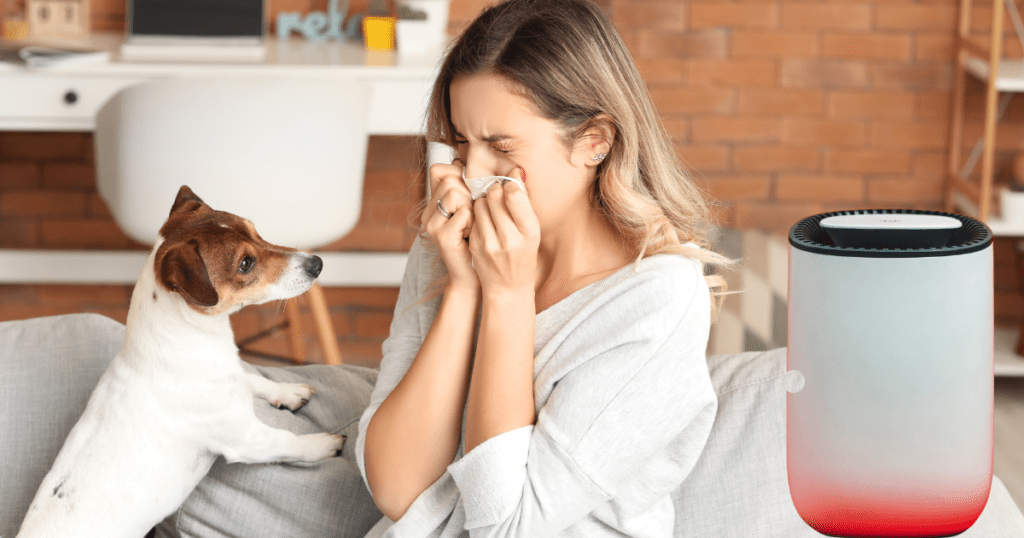
For many of us, feeling comfortable at home means more than just the right temperature. Have you ever considered humidity levels? The EPA suggests that keeping humidity between 30% and 50% is ideal for respiratory health. That’s where dehumidifiers for health come in. They help by reducing excess moisture in the air, making it easier to breathe and creating a more comfortable environment. Especially if you struggle with allergies or respiratory issues, a dehumidifier can make a big difference in how you feel at home.
Table of Contents
The Link Between High Humidity and Health Issues
High humidity levels (above 50%) can create a breeding ground for mold and mildew growth. These allergens can trigger respiratory problems like asthma attacks, allergies, and sinus congestion.
Here’s a table summarizing some of the health concerns associated with high humidity:
|
Health Concern |
Impact of High Humidity |
|
Asthma |
High humidity can irritate airways, triggering asthma symptoms like wheezing, coughing, and shortness of breath. |
|
Allergies |
Dust mites and mold thrive in humid environments, worsening allergy symptoms like sneezing, runny nose, and itchy eyes. |
|
Respiratory Infections |
High humidity can make it easier for viruses and bacteria to spread, potentially increasing the risk of respiratory infections. |
How Dehumidifiers Promote Respiratory Health
Dehumidifiers work by drawing in moist air, condensing the moisture into water, and then releasing the drier air back into the room. By reducing humidity levels, dehumidifiers can offer several health benefits, especially for those with allergies and respiratory issues:
- Reduced Allergens: Lower humidity levels make it difficult for dust mites and mold to thrive, significantly reducing exposure to these common allergens.
- Easier Breathing: Drier air can improve airflow in the lungs, making it easier to breathe, especially for those with asthma or chronic obstructive pulmonary disease (COPD).
- Improved Sleep Quality: High humidity can lead to a stuffy nose and disrupt sleep. Dehumidification can create a more comfortable sleeping environment, promoting better sleep quality.
- Reduced Risk of Respiratory Infections: A drier environment can help prevent the spread of viruses and bacteria that contribute to respiratory illnesses.
Dehumidifiers Beyond Allergy and Respiratory Relief
While the health benefits for respiratory conditions are significant, dehumidifiers offer additional advantages:
- Prevents Mold Growth: Mold thrives in humid environments and can damage your home and belongings. Dehumidification minimizes the risk of mold growth, protecting your property and health.
- Protects Wood Furnishings: Excess moisture can warp and crack wood furniture and flooring. Dehumidification helps maintain a stable moisture level, safeguarding your valuable wood furnishings.
- Improves Electronics Functionality: Electronic equipment is susceptible to moisture damage and corrosion. Dehumidification creates a drier environment that protects your electronics from moisture-related malfunctions.
Choosing the Right Dehumidifier for Your Needs
Not all dehumidifiers are created equal. Here are some factors to consider when choosing one for your needs:
- Capacity: Choose a dehumidifier with a capacity suitable for the size of your space. A larger dehumidifier is needed for bigger rooms or areas with high humidity levels.
- Type of Dehumidifier: There are two main types of dehumidifiers – refrigerant and desiccant. Refrigerant dehumidifiers are better suited for warm climates, while desiccant dehumidifiers work well in cooler climates.
- Features: Consider features like a built-in humidistat (to automatically maintain desired humidity levels), a timer, and a washable air filter (to trap additional allergens).
Maintaining Your Dehumidifier for Optimal Performance
To ensure your dehumidifier functions efficiently for years to come, follow these simple maintenance tips:
- Empty the Collection Tank Regularly: Empty the water collection tank frequently to prevent overflows and potential mold growth within the tank.
- Clean the Air Filter (if applicable): Most dehumidifiers have washable air filters that trap dust and debris. Clean them regularly according to the manufacturer’s instructions.
- Clean the Coils (Refrigerant Dehumidifiers): For refrigerant dehumidifiers, gently clean the evaporator and condenser coils with a soft brush to remove dust buildup that can hinder airflow and efficiency.
- Proper Storage: When not in use, store your dehumidifier in a clean, dry place. This prevents mold growth within the unit during storage.
Conclusion: Breathe Easy with a Dehumidifier
Dehumidifiers are vital not only for controlling humidity but also for health and comfort. They provide relief for asthma sufferers and contribute to overall well-being by reducing allergens and mold growth. Investing in a dehumidifier for asthma relief or a dehumidifier for health is an investment in your family’s health. With proper maintenance, including using humidity controller equipment, you can ensure optimal performance. Consult your doctor to determine the best solution for your specific needs. Contact us today to find the perfect dehumidifier for your home and enjoy a healthier living environment
FAQs
Qn. Can a dehumidifier cause respiratory problems?
Ans. While a dehumidifier can reduce allergens and ease breathing, it may worsen conditions like pneumonia if the air becomes too dry. It could also lead to skin and hair problems or exacerbate a dry cough or stuffy nose. Remember, a dehumidifier’s purpose is to extract moisture from the air in your home.
Qn. Do dehumidifiers affect your health?
Ans. Dehumidifiers can indeed alleviate allergens and facilitate easier breathing. However, excessive dryness in the air might exacerbate conditions like pneumonia or lead to skin and hair issues. It’s important to find a balance in maintaining optimal humidity levels for your health while using a dehumidifier.
Qn. Is it safe to be around a dehumidifier?
Ans. Properly used dehumidifiers are generally safe, following manufacturer guidelines. Yet, there are potential risks such as electrical hazards or fire, particularly if maintenance is neglected or if the unit is faulty. Regular inspection, cleaning, and awareness of any unusual signs are essential for safe operation.

One Response